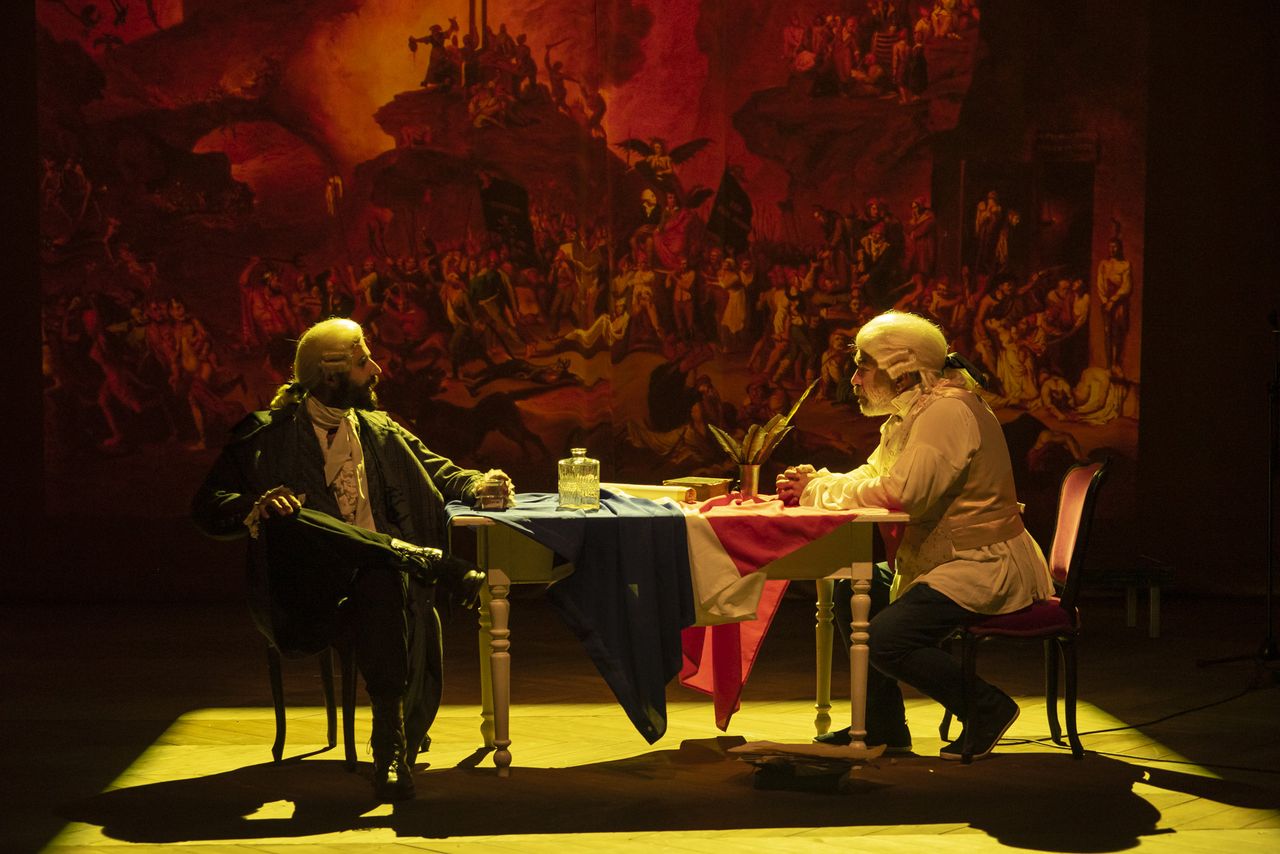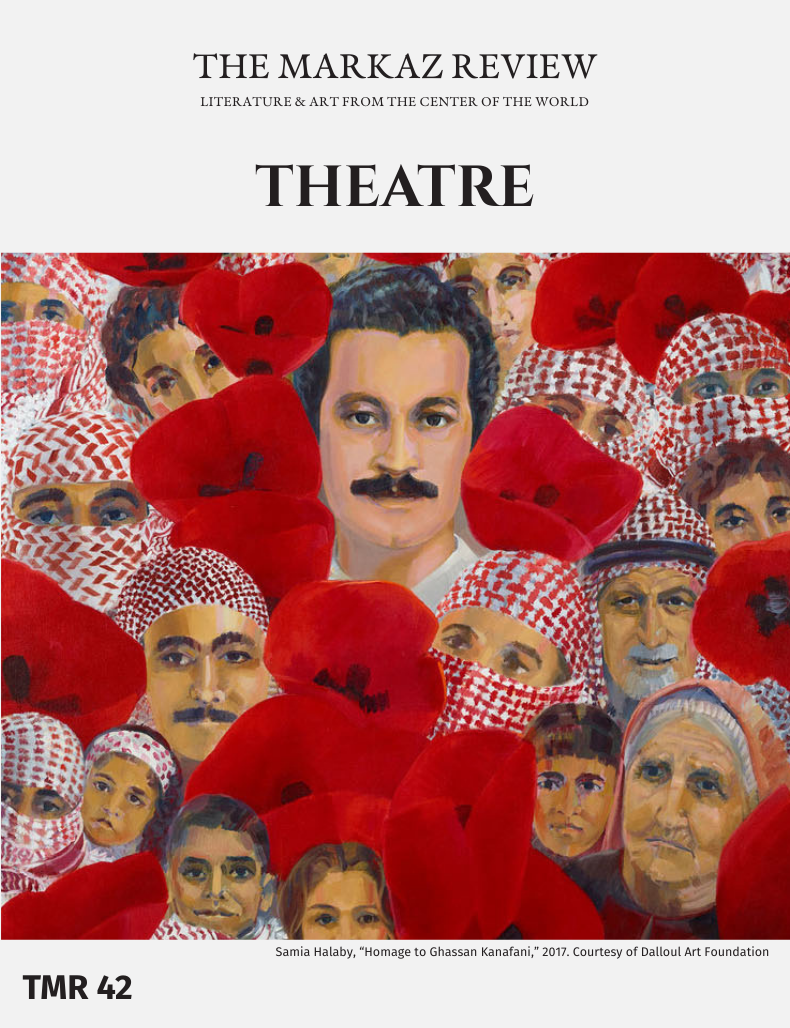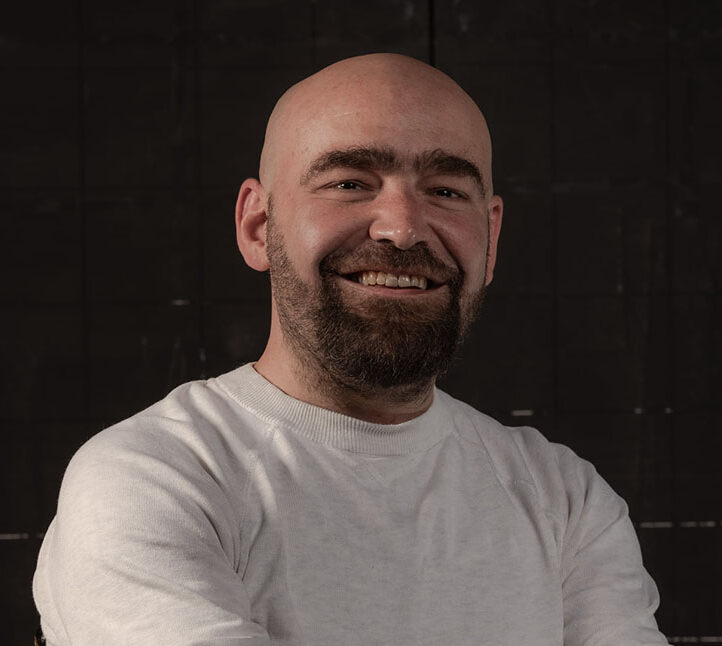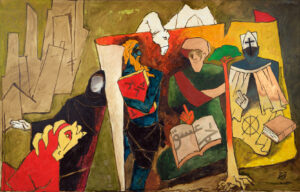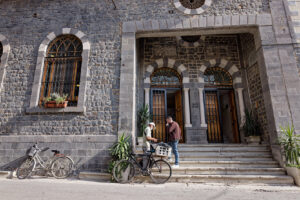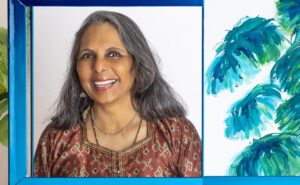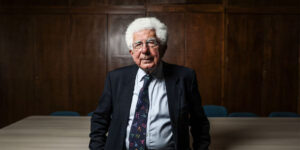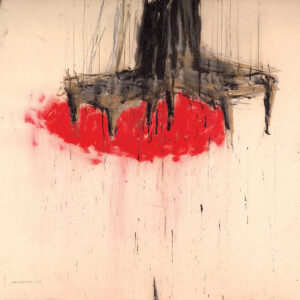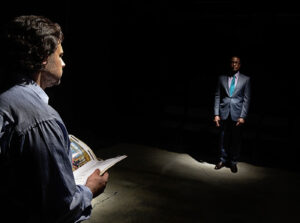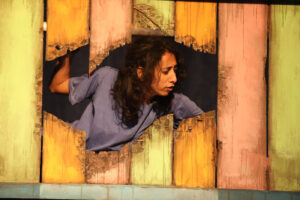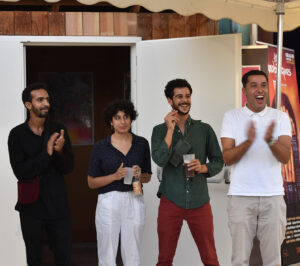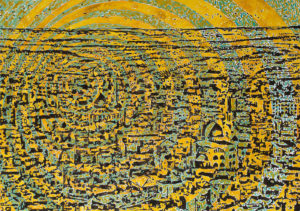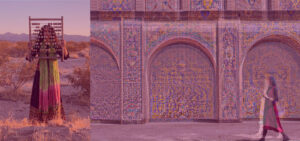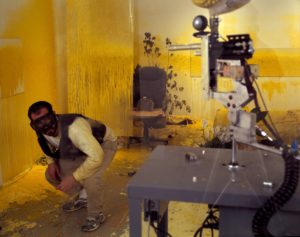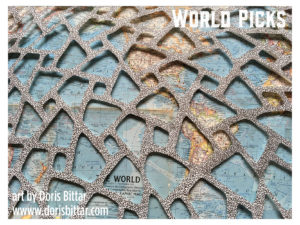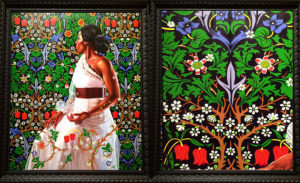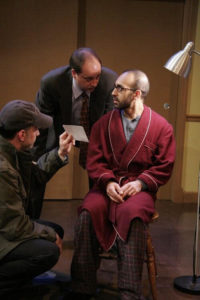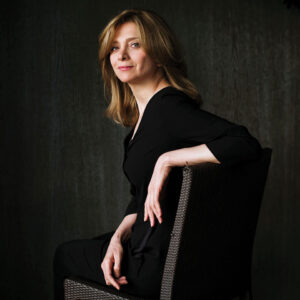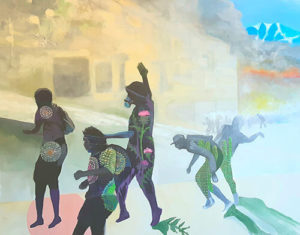A play about the French Revolution, The Return to Danton, is a prism through which its Syrian actors and theatre makers consider their own revolution and life as artists in exile.
Collective Ma’louba takes its name from “upside down” in Arabic. It was founded by Syrian theatre makers and graduates from the Higher Institute of Dramatic Arts in Damascus, now in exile and based in Europe. The collective’s theatrical works reflect on the lived experiences of Arabs in a global context: their historical, political and colonial links and the unsettled status of existence. Collective Ma’louba’s topical plays include themes of migration, identity, culture, freedom, and the nature of theatre.
Their productions — Your Love Is Fire (2017), Days in the Sun (2018), Reine Formsache (2019), The Return of Danton (2021); Up There (2022), a play about Duma women’s prison in Damascus, which received an Ibsen Scope award; and The Long Shadow of Alois Brunner (2023) — have toured extensively and have been performed at Theater an der Ruhr Mülheim, Kammerspiele München, Made in Germany Festival Stuttgart, Summerhall, Edinburgh, Novi Sad, Serbia, Euro-scene Leipzig, and Factory International, Manchester.
The Return of Danton was featured at 2021 Shubbak Festival and Refugee Week, in London. The play tells the story of a company of German-based Syrian actors in rehearsal for a contemporary adaptation of Georg Büchner’s Danton’s Death, a German classic that has at its center the conflict between two giants of the French Revolution, Danton and Robespierre.
In The Return to Danton, the Syrian company’s director believes their adaptation of Büchner’s play will secure the group funding. However, the playwright turned dramaturge is more committed to the idea of writing a new play about the everyday lives of Syrian refugees, in Europe. As the Syrian company wrestles with Büchner’s manically intense play, life mirrors art as the two lead actors are caught up in the arguments between the writer and director.
Between catastrophic line runs and overlong cigarette breaks — and for one of them, spliff breaks — the four lock horns about their conflicted views on the Syrian revolution and their roles as artists in exile. Tensions and disagreements grow as the company — almost unknowingly — engage more deeply with the themes of the play: what is a revolution? When does it end? Ten years after the Syrian revolution, do they really understand what happened and how they can tell their story?
In 2021, The Stage called The Return to Danton: “A nuanced piece of meta theatre about revolution and German theatre … a clever, multi-dimensional piece of writing.”
Collective Ma’louba was initiated in 2016 by Theater an der Ruhr to offer professional working conditions to Syrian artists in Germany. It was the company in residence until 2021 and still rehearses there.
The Return of Danton
Scene 2
Day 5.
(Complete darkness … spotlight on
Eyas standing at the front
of the stage)
EYAS
The Return of Danton.
How did Danton return? Why did he return? Who is Danton?
Hello. My name is Eyas … Syrian director living in Germany since 2015. I’m the director of The Return of Danton, which I’ll talk to you about. Maybe many of you know the play Danton’s Death by the German author Georg Büchner, the writer who lived from 1813 to 1837, meaning he lived for 23 years only. He wrote three plays only but nevertheless left a big mark on German theatre, particularly his play Danton’s Death … Why this play in particular? For many reasons but the main reason in my opinion is that the play deals with what could be considered the most important event in the history of Europe and the modern world, namely the French Revolution … specifically the period after the victory of the revolution … the period known as the Reign of Terror … The play centers around the last days of George Danton who was one of the leaders of the French Revolution … He participated in the overthrow of the monarchy and he took part in the massacres that the revolutionaries carried out to wipe out the monarchy. However, Danton objected to the policies of his comrade Robespierre, which were excessively bloody so much so that the guillotine became the symbol of the period. He raised the slogan of the rule of virtuous through terror. Danton objected to Robespierre’s policies and called for an end to the killings and laying the foundations for a just civil life for which the revolution was launched. Robespierre considered Danton corrupted and if left to his own devices could jeopardize the gains of the revolution and see to it that the obsolete monarchy is returned. And so Robespierre decides that Danton and his followers must be driven to the guillotine like all the enemies of the revolution and the enemies of virtue …
Why Danton’s Death?
The first time I read Danton’s Death, I was a student at the Higher Institute of Dramatic Arts, I was forced to read it … I did not like it. The language was difficult, and the idea of the revolution at the time in 2001, 2002 was something beyond imagination, something that could not happen in reality. After the Syrian revolution in 2011, I thought about the play. I read it more than once, the language was still difficult, but the difference is that the revolution that the play is talking about was no longer something imaginary or coming from the depths of history. I started to read about the play and about the French revolution. I became preoccupied with the topic even though it was clear that there is no comparison between the two revolutions, but during the research there were many interesting details.
For example when I looked at the drawings illustrating the Reign of Terror like the image of the severed heads held up next to the guillotine, I could stare at the image, looking at every detail … at the same time, I couldn’t look at a single image coming from Syria … I noticed that as I read and researched the subject my mind would wonder … I would think … as if I relied on Danton’s Death to find the answers for the difficult questions that the Syrian revolution posed. What does a revolution mean … what does it mean that a revolution succeeds or fails …
I noticed also that the sentence that Robespierre says “to carry out a revolution by halves is to dig your own grave” is a phrase that is very common in the Arab world, especially after the Arab Spring. On Google, I found lots of articles with that title. They were all articles from Arab countries where revolutions had taken place and almost all of these articles were critical of the revolutions. What’s strange is that many sources attribute the saying to Mao Zedong even though Robespierre said it long before him.
What does all this mean to me?
I need all this … to understand … to understand why it happened … how we reached this state … to understand why now exactly … I’m standing here before you and I will tell you why I’m working on Danton’s Death … Understanding for me is not a wish … it’s a need
(to Rahaf)
How is it?
RAHAF
Maybe you need to say something about how you are going to work on the show.
EYAS
Maybe … Maybe it’s better I don’t talk about that specifically … because honestly I’m not ready to talk about it … nothing is clear to me … there are many things in my head … videos … images … voices … but I’m afraid to say something I’m not sure about … Whatever I say will be counted against me … and could affect the way they see the work.
RAHAF
If someone asks you.
EYAS
As far as I know there won’t be questions from the audience.
RAHAF
Usually at such a presentation for financiers, there is a Q&A.
EYAS
If it happens, I’ll find a solution … I’ll manage.
RAHAF
OK, can we sit and talk a little … Zeno is here to solve the problem.
EYAS
There is nothing to solve … He stops smoking hash then we can work together … that’s all.
ZENO
OK, if that’s the way it is then I’ll say goodbye.
RAHAF
One sec … can we talk … hear each other out … try to solve the problem … please sit down if you don’t mind.
(Zeno sits at one end of the table,
Eyas at the other, Rahaf in the middle)
RAHAF
Go ahead Zeno.
ZENO
I can’t stop smoking hash … I’ve been living like this for ten years and I’m fine. I live my life the way I like it … and I work as DJ, a job I love, after acting of course … But I’m done with acting. I don’t want to do it. Who am I going to act for … in what language … Our brother here came and started filling my head with projects, dreams and stories … so OK, I came to work with you. I stopped my job temporarily to see what will happen with this troupe … Then you come and tell me to stop smoking hash … and stop DJing and you make me love acting … then with the first problem you tell me I’m not needed … You’re not needed!
RAHAF
Zeno … we’re trying to solve the problem, not make it worse.
EYAS
Zeno I appreciate you coming. But you are making things difficult for me. What you are demanding is impossible. For a troupe to succeed here in Germany it has to fight and the first thing to fight against is ourselves …You can’t be a professional actor, successful and in demand while a hash cigarette is constantly in your hand … it’s impossible.
ZENO
I don’t want to be a successful actor, bro.
EYAS
Liar … do you want me to remind you when we were drunk …You were crying and saying, “I want to act Eyas. I want to act.”
ZENO
I said that.
Yes you said that. And a girl was in the bar, she felt sorry for you and came over and hugged you. And in the end, you went home together.
ZENO
Me!!!
EYAS
Yes you.
ZENO
It’s not true and if true then I was drunk.
EYAS
If you want to act or not that’s up to you … but if you want to continue with us, you have to stop the hash.
ZENO
You’re really ambitious … I can’t stop.
EYAS
You can but you don’t want to.
ZENO
Imagine I stopped the hash … and I committed to the work … And I regained my desire for acting … and everything is fine as you want it … Imagine I do all that and we don’t get the funding … Or we get the funding but the audience doesn’t like the play … Imagine the audience doesn’t even get the play… what should I do then?
EYAS
You can’t look at it this way, you have to take a chance, you have to sacrifice.
ZENO
He tells me to sacrifice … Bro, I’m happy as I am, I don’t want to sacrifice … then you think if the project doesn’t succeed I can go back to my life as normal … no, it’s not true at all … going back to my life will be more difficult … because you awakened a dream that I buried for ten years … I don’t want to waste another ten years of my life.
EYAS
OK, the choice is yours.
ZENO
I will work with you but on my terms.
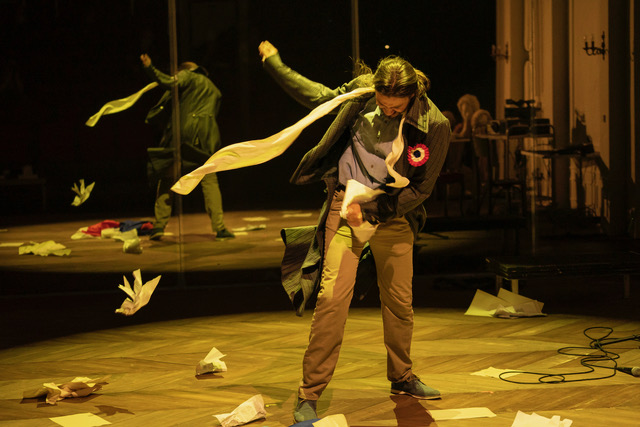
EYAS
It won’t work.
RAHAF
Can you both listen to me … both of you are right … but both of you are holding onto your positions … we need to be flexible to solve the problem … that means Zeno won’t stop the hash completely but reduce it … he’ll smoke the bare minimum that puts him in a good mood … at the same time he can concentrate and work with us.
EYAS
How can you guarantee that?
RAHAF
I’ve prepared a letter of agreement that stipulates all you want … the both of you … I’ll read it to you and you tell me what you think. A letter of agreement between the director Eyas and the actor Zeno.
Zeno agrees to smoke no more than one joint a day.
Zeno will smoke the joint in stages so that it won’t affect his concentration or the rehearsal.
Smoking will be either before the rehearsal or afterwards and during breaks.
The director has to facilitate the smoking stipulated above.
The actor has to stick to the quantities stipulated above.
The dramaturge, Rahaf, will make sure both parties adhere to this agreement.
What do you think?
EYAS
It won’t work. What guarantees for me how long the joint will be or how much hash it will contain.
ZENO
Fuck you, you won’t even agree to one joint.
EYAS
OK one joint that won’t exceed three centimeters.
ZENO
Keep your three centimeters for your mother.
EYAS
And the hash will be a quarter of a gram.
ZENO
Fear god you tyrant … don’t you have sisters who smoke hash.
EYAS
That’s all I have for you.
ZENO
No habibi, the joint will be five centimeters and the quantity of hash half a gram.
EYAS
Three centimeters and a quarter gram.
RAHAF
Four centimeters and the quantity a third of a gram … agreed.
(Silence)
EYAS
Agreed.
ZENO
Agreed.
RAHAF
Now kiss and make up.
ZENO
Before we do that a question … When I cried and said I want to act … and the girl came to hug me and I went with her … was she pretty?
EYAS
I swear she was very pretty.
(Enter Mohammed)
ZENO
Did she say what her name was … can you remember her name or anything about her?
EYAS
Sabina.
ZENO
Sabina … you swear.
EYAS
I swear … Sabina. OK Guys I have to take a call with a newspaper. I won’t be long … prepare the confrontation scene between Robespierre and Danton.
MOHAMMED
Man, I just arrived now. Let me smoke a cigarette first.
EYAS
Smoke as you prepare the scene.
(Mohammed, Zeno and Rahaf exit)
(Eyas dials a number and speaks in broken English)
EYAS
Yes, hello carina, I am ready, is it ok to speak in English? Yes please …
I am here in Germany since 2015, no I am here alone, no this is not my first project here in Germany, I do theatre workshops with refugees and we did many plays together with German artists, what? … Sorry? Can you please repeat the question … me … by plane … yes I came to Germany by plane … No no boat … Sorry no boat … Yes I had a Schengen visa … ya sorry Schengen visa … Yes it is a very good for me to be here in Germany working in German theatre with German artists it is amazing … You cannot imagine how great it is … amazing … wow … Awesome … yes and specially this project the return of Danton let me tell you why Danton … Because … sorry … ah ok … Now theatre in Syria is very difficult to make theatre in Syria if you are not supporting al-Assad … so as example I cannot present the return of Danton in Syria you know why … Because … ah ok … Who? The refugees … I don’t know if the refugees will come to see our show … I don’t know if the refugees go to theatre in Germany … I don’t know … I don’t know … I don’t know … Sorry I did not understand … My opinion … about what? … Integration … Well I think integration is very important yes it is very, very important … I like the integration … and you see that when you know why I am doing the return of Danton because … ah ok … that is it … ah ok … Thank you … goodbye …
Come on guys, are you ready?
(Enter Rahaf, Zeno, Mohammed and
begin preparing the scene of the
confrontation between Robespierre
(Mohammed) and Danton (Zeno).
Costume and set design reflects the
French revolution period).
ROBESPIERRE
I tell you, whoever holds my arm back when I draw the sword is my enemy. His motives are beside the point. He who hinders me in my self-defense kills me, as surely as if he had attacked himself.
DANTON
Where self-defense ends murder begins. I see no necessity for going on with these killings.
ROBESPIERRE
The social revolution is not yet accomplished. To carry out a revolution by halves is to dig your own grave. The society of the privileged is not yet dead. Vice must be punished, virtue must rule through the Terror.
DANTON
I don’t understand the word “punished.” You and your virtue, Robespierre! You’ve taken no money, you’ve run up no debts, you’ve slept with no women, you’ve always worn a decent coat and never got drunk. Robespierre, you are infuriatingly righteous. I would be ashamed to wander between heaven and earth for 30 years with such a priggish face, for the miserable pleasure of finding others less virtuous than myself. Is there no small, secret voice in you whispering just occasionally: “You are a fraud?”
ROBESPIERRE
My conscience is clear.
DANTON
Conscience is a mirror before which a monkey punishes itself. Everyone rigs himself up in what finery he has and goes out to have fun in his own way. We all try to defend ourselves against spoilsports. Is it right that you turn the guillotine into a washtub for other people’s stained linen just because your own coat is brushed and clean?
You’re perfectly entitled to hit out if people spit on it or tear holes in it. But what business is it of yours if they leave you in peace? Why should you lock them up in a coffin so long as they don’t get in your way? Are you God’s policeman? And if the sight’s too much for you, as it seems to be for your blessed Almighty, then put a handkerchief over your eyes.
ROBESPIERRE
You deny the existence of virtue?
DANTON
And of vice. Everyone acts according to his nature — in other words he does what does him good. But it’s cruel to kick your stilts from under you like this, eh, Incorruptible?
ROBESPIERRE
Danton, there are periods when vice is high treason.
DANTON
For God’s sake don’t proscribe it. That would be ungrateful. You owe it too much — by contrast, I mean. But to use your own terminology, our blows must be of service to the republic. We mustn’t strike the innocent along with the guilty.
ROBESPIERRE
Who says that a single innocent man has suffered?
DANTON
Not one innocent man dead!
(On his way out)
There’s not a moment to lose; we must show ourselves! … Who am I saying this to?
EYAS
He’s talking to himself.
MOHAMMED
There’s not a moment to lose; we must show ourselves! … saying that to himself! It doesn’t work.
EYAS
He says this to Paris who is next to him throughout the scene. But I removed this character … I don’t even understand why Paris is in the scene. He doesn’t say a word. OK, leave the sentence. There’s not a moment to lose; we must show ourselves! … myself … I must show myself.
RAHAF
I have to show myself now … this won’t do … you can’t solve things this way … When Buchner wrote this scene, he could have just had Robespierre and Danton on their own. But instead he had Paris with them. Why is that? And why doesn’t he say anything? You can’t just skip over these questions.
EYAS
Do you have an answer to these questions?
RAHAF
No … but we have to search for the answers … we have to think and put down hypotheses and test them.
EYAS
You want me to do all that in ten days …
RAHAF
Back again to the issue of time … could you find another excuse.
EYAS
Another excuse …
(Long silence)
EYAS
(To Zeno and Mohammed)
Leave us alone if you don’t mind.
MOHAMMED
But we want to hear this conversation.
EYAS
Leave us alone. Meanwhile Mohammed, prepare the Saint-Just speech if you don’t mind.
(They exit)
EYAS
What do you want?
RAHAF
Do it right.
EYAS
You think the way I work is wrong?
RAHAF
That’s obvious.
EYAS
And I see that the way you work is wrong … what’s the solution?
RAHAF
You should be flexible … because I’m the dramaturge.
EYAS
I’m the director and my job is to make this project achieve the goals we’ve agreed on.
RAHAF
The goal we’ve agreed on is to make a play that represents us all … not just you.
EYAS
Is it part of the dramaturge’s job to prove to the whole team that they are all idiots and she’s the only clever one?
RAHAF
What do you want?
EYAS
I want you to be with me … to help me … everything you are doing until now is to prove that I am wrong.
RAHAF
So you want me to agree with everything you say.
EYAS
I want you to trust me … the way I envision the project is what will get us the funding.
RAHAF
That means we don’t have the same goal. You care about the funding, I care about a show that reflects me and that I can defend.
EYAS
You won’t reach your goal if I don’t reach mine.
RAHAF
But they are the opposite of each other.
EYAS
No … Let’s put it another way. Our goal is one. But there is a transitional goal we need to achieve to reach the greater goal.
RAHAF
I’m leaving.
EYAS
Why?
RAHAF
I don’t want you to give me a role so I could stay.
EYAS
What are you talking about?
RAHAF
This is what’s happening … I was the writer on the other project we were planning which I was and still am working on … now with the Danton’s Death I have no place … You’ve designated me as dramaturge but the truth is that there is no role for a dramaturge in the project.
EYAS
How long we tried to get funding for your project and failed? … The idea of doing Danton’s Death has at least given us the opportunity to meet with financiers … we’ve talked for a while about doing a Syrian version of Danton’s Death … and you liked the idea … and for that to happen we have to use the time wisely.
RAHAF
You’ve decided all this on your own.
EYAS
I had to make the decision on my own …
RAHAF
OK, I want you to answer one question … why do you want a dramaturge working with you?
EYAS
Your role as dramaturge in the project is important but not at this stage because we don’t have time.
RAHAF
But you need me now when you are creating the whole show … and you are doing it on the wrong basis.
EYAS
Not wrong, Rahaf. Just because you don’t like it and it doesn’t sit with your way of thinking doesn’t mean it’s wrong … They way I see it is that putting the story of the two revolutions, the French and the Syrian through Danton’s story is important … I like as an artist to do that, I’m not faking it just to get funding.
RAHAF
I don’t want to prove that you are cheating to get the financing …
EYAS
You are afraid that we are appearing to cheat in order to get funding … right.
RAHAF
I feel like it is too big a stone … Either we leave the stone … or we think of the right way to carry it.
EYAS
What big stone … why too big? If you are afraid then you couldn’t carry a pebble … who decides what size stone we can carry. Why must I be frightened how people will evaluate my work.
RAHAF
You don’t need to be frightened … but you have to care … You have to give the work its due …
EYAS
I don’t start rehearsals until I’ve read everything about the history of Europe and the French revolution, until I have a clear and detailed argument for why I want to do the show … without that I don’t have the right to do the play…
RAHAF
What are you defending?
EYAS
I’m defending my right to make a mistake.
(Mohammed enters suddenly
and quickly and begins gathering
his things to leave)
MOHAMMED
I’m sorry … I have to leave now.
EYAS
What happened?
MOHAMMED
Nothing I just have to see Widad and talk to her.
EYAS
Something happened?
MOHAMMED
Same story.
EYAS
So you can talk later.
MOHAMMED
What does that mean?
EYAS
It means we finish the rehearsal.
MOHAMMED
Are you serious … you want me to continue in this state.
EYAS
Of course that’s what I want.
MOHAMMED
OK Mr. Eyas … I’ll do the Saint-Just monologue.
SAINT-JUST
There seem to be in this assembly some delicate ears which cannot stand the sound of the word “blood.”
A variation in the chemical composition of the air, an outbreak of subterranean fire, a change of balance in a body of water, and an epidemic, a volcanic eruption, a flood swallow up thousands. What is the result? A minor, scarcely perceptible alteration of physical nature.
Shall a phenomenon which is completely remolding moral nature, that is man, draw back at the sight of blood? History works through these arms of ours in the spiritual sphere just as, in the physical, it works through volcanoes and floods. What difference does it make if those men move their last in an epidemic or in a revolution? Moses led his people through the Red Sea and into the wilderness till the old corrupt generation was exterminated, before he founded his new state. Legislators! We have no Red Sea and no wilderness, but we have war and the guillotine.
(Mohammed snaps out of the role)
MOHAMMED
There you go, man. Fuck you and fuck the stage and fuck the revolution and fuck Danton.
(Takes his bag and exits)
RAHAF
I’ll go with him.
(Exits)
ZENO
What are we done for the day.
(Silence)
ZENO
Can I roll a joint?
(Silence, Eyas exits, Zeno rolls
a joint, darkness).



